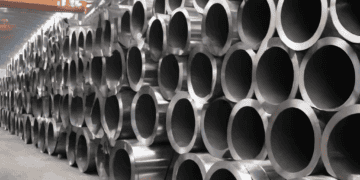In March 2018, President Donald J. Trump declared intentions to impose widespread tariffs on steel and aluminum imports, citing national security concerns due to the deterioration of domestic industries. These measures, imposing a 25 percent tariff on steel and 10 percent on aluminum, sparked debates among economists, trade experts, and industry stakeholders.
The administration’s authority to implement these tariffs stems from a 1962 trade law, utilizing a national security basis rather than purely economic reasoning. The Commerce Department’s investigation into the impact of steel and aluminum imports on national security prompted the conclusion that such imports indeed posed a threat. This decision paved the way for Trump’s tariff announcement, following previous tariffs on solar panels and washing machine imports.
While major domestic steel and aluminum producers welcomed the tariffs, many economists remain skeptical about their effectiveness. Past attempts to protect the steel industry failed to address its decline, with factors such as technological advancements and decreased demand being major contributors to job losses. Moreover, economists express concerns that increased costs of steel and aluminum due to tariffs may adversely affect various industries reliant on these metals, potentially leading to job losses and consumer price hikes.
Comparatively, previous presidents imposed tariffs to safeguard U.S. industries from foreign competition. However, Trump’s tariffs distinguish themselves by their broader scope and application to all countries, unlike past measures targeting specific nations or providing exemptions for close allies. Additionally, the invocation of a national security law and the opaque process of implementation deviate from traditional trade actions based on economic conditions and subject to periodic review.
The implications of these tariffs extend beyond the domestic sphere. Washington’s imposition of such measures risks triggering retaliatory actions and escalating into a trade war, impacting allies like Canada, Germany, Japan, and South Korea, among others. This has prompted discussions of retaliatory measures and investments being put on hold by European companies.
The potential consequences at the World Trade Organization (WTO) are also under scrutiny. While countries may challenge Trump’s tariffs at the WTO, the existence of exemptions for national security measures complicates such disputes. Analysts fear that a ruling against the U.S. could lead to disregard for WTO decisions or even withdrawal from the organization, while a ruling in favor of the U.S. could encourage protectionist actions from other nations, potentially easing pressure on China and its trade practices.
In summary, the imposition of steel and aluminum tariffs by the U.S. raises concerns among experts about its efficacy, potential repercussions on global trade, and its impact on established international trade norms and relations.
Your source for supply chain report news updates: The Supply Chain Report. For international trade insights and tools, head to ADAMftd.com.
#SteelTariffs #AluminumTariffs #TradeWar #NationalSecurityTariffs #USTradePolicy #DonaldTrump #WTOImpact #GlobalTrade #SteelIndustry #AluminumIndustry #EconomicPolicy #TradeRetaliation #USTradeRelations #SteelProduction #AluminumProduction #TradeExemptions #USEconomy #GlobalEconomy #InternationalTrade #TariffDebate #WTOChallenges















